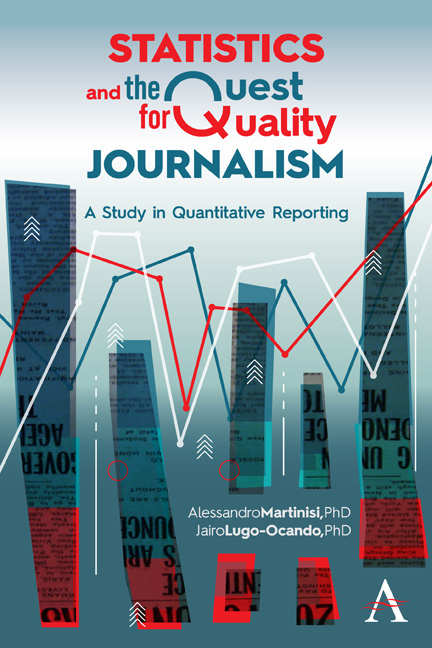Book contents
- Frontmatter
- Dedication
- Contents
- List of Illustrations
- 1 Introduction
- 2 Numbers as Information in the Information Society
- 3 The Never-Ending Debate on Quality in Journalism
- 4 Statistics in Journalism Practice and Principle
- 5 The Normative Importance of ‘Quality’ in Journalism
- 6 Journalism Meets Statistics in Real Life
- 7 The Ideology of Statistics in the News
- Epilogue
- References
- Index
2 - Numbers as Information in the Information Society
Published online by Cambridge University Press: 07 November 2020
- Frontmatter
- Dedication
- Contents
- List of Illustrations
- 1 Introduction
- 2 Numbers as Information in the Information Society
- 3 The Never-Ending Debate on Quality in Journalism
- 4 Statistics in Journalism Practice and Principle
- 5 The Normative Importance of ‘Quality’ in Journalism
- 6 Journalism Meets Statistics in Real Life
- 7 The Ideology of Statistics in the News
- Epilogue
- References
- Index
Summary
To understand how journalists use statistics to achieve quality, we need first to contextualize news reporting practice within the wider ideological context of professionalization. In this sense, Professor Mark Deuze (2005) has argued that the professional identity of journalists is held together by an occupational ideology of journalism. Historically speaking, a person's occupation exerts important influence in determining their role and their family's position in society, and in the past even the place the individual would live (Mack, 1957), which also underpins the more general ideologies that these individuals embraced as part of their beliefs (Dibble, 1962). However, the great reconfiguration of society that took place in the West due to deindustrialization, the growth of the service and financial sectors and the creation and incorporation of a set of Information and Communication Technologies (ICTs) that alter most people's daily lives have meant that all professionals now operate under very different occupational ideologies.
These transformations can be encapsulated within the notion of the Information and Network Society about which several authors have referred to over the years (D. Bell, 1973; Castells, 2011; Drucker, 2012; Mattelart, 2000, 2003). It is a concept that reflects specific trends in the capitalist society and that has had an important impact in particular areas such as the media industry. Perhaps no other profession has had to endure such significant changes as journalism given not only the dissemination of the political economy that used to sustain the media industry but also the development of a completely new media ecology that has transformed working conditions and professional practices around news reporting.
Therefore, the use of statistics in journalism should be understood within the context of the Information Society. The notion of the Information Society took shape during World War II with the invention of ‘thinking’ machines (Dyson, 2012). However, it only became a standard reference in academic, political and economic circles from the 1960s onwards, thanks to promotion of the idea by scholars such as Daniel Bell (1973, 1976), who is recognized as the foremost writer on the Information Society, developing a robust argumentation around the subject from the 1960s to the 1990s (Duff, 1998).
- Type
- Chapter
- Information
- Statistics and the Quest for Quality JournalismA Study in Quantitative Reporting, pp. 15 - 30Publisher: Anthem PressPrint publication year: 2020



